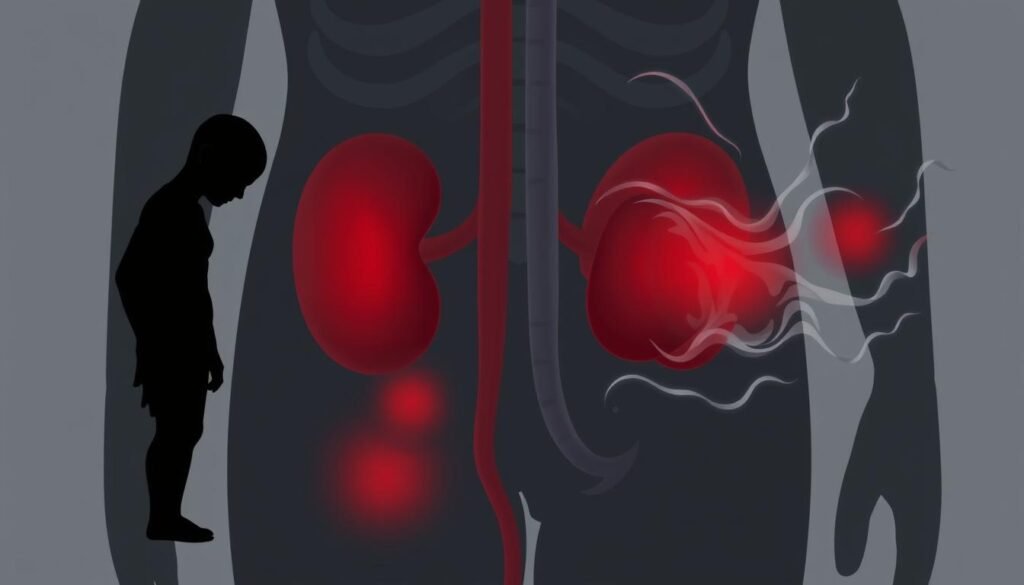Did you know about 20% of women get a urinary tract infection (UTI) at some time? This health problem affects millions each year. It is more common in women. Most know the usual UTI signs like painful peeing and wanting to go often. But, many don’t know UTIs can also make you very tired. We’re diving into whether UTIs can bring on fatigue, looking at the usual signs, and explaining why these infections make you feel drained. Knowing how UTIs link to tiredness helps people spot symptoms early and get the right help.
Key Takeaways
- UTIs are particularly prevalent in women, with 1 in 5 experiencing one at some point in their lives.
- Common symptoms include changes in urination, pain, and fatigue.
- Fatigue can significantly affect daily life, often leading to confusion, especially in older adults.
- Recognizing UTI symptoms early can lead to faster diagnosis and treatment.
- Behavioral lifestyle changes can help prevent recurrent UTIs.
Understanding Urinary Tract Infections
Urinary tract infections (UTIs) affect different parts of the urinary system, like the urethra and bladder. The main cause of most UTIs is E. coli bacteria, which are usually found in the gut. Women are more likely to get UTIs than men because they have a shorter urethra.
Many things can increase the risk of getting a UTI. For women, risks include sexual activity or changes during menopause. Other factors like being older, having diabetes, using a urinary catheter, or issues like bowel incontinence, also play a role. These issues make some people, especially women, more likely to get UTIs often.
Symptoms of a bladder infection depend on which part is affected. Signs to look out for include:
- Cloudy or bloody urine
- Low-grade fever
- Pain or burning sensation during urination
- Abdominal cramping
- Frequent urges to urinate
If the infection reaches the kidneys, you might feel very tired and more uncomfortable. Knowing about bladder infection symptoms is vital. Without treatment, UTIs can cause serious issues like kidney damage or sepsis. But, with early treatment, symptoms often get better in 24 to 48 hours.
To avoid urinary tract infections, it’s good to practice healthy hygiene and drink plenty of water. Women can lower their UTI risk with simple steps. Pee after sex, wipe from front to back, and wear cotton underwear to stay dry.
Common Symptoms of UTIs
Urinary tract infections, or UTIs, have distinct signs. People might often feel the need to go to the bathroom. They may feel pain or a burning feeling when they pee. Their urine could also look cloudy or smell bad.
Some people also experience back pain and overall tiredness. Women are more likely to get UTIs because of their body structure. Their urethra is shorter and closer to the back passage.
Older adults may show different signs, like being confused or feeling very tired. If the UTI is more severe, they might have a fever or not feel like eating. They could also feel extremely worn out, which shows how bad the UTI is.
It’s important to spot these symptoms early. If not, the infection could get worse and make you feel even more tired. Knowing the signs, especially for women and older people, helps in taking care of your health.
Can UTI Cause Fatigue?
Fatigue is a common but often ignored symptom of UTIs. Exploring how UTI and tiredness are connected shows us how our bodies react to infections. This reaction can make us feel very tired. When we have a UTI, our body fights the infection, causing inflammation. This makes us feel wiped out and turns simple tasks into big challenges.
Link Between UTIs and Tiredness
A lot of American women will get a UTI at some point. Men get them too but not as often. When people have a UTI, they feel drained of energy. This makes it tough to keep up with daily life. Older people who get UTIs often feel more tired than usual. This tiredness is not like feeling a little sleepy; it’s an intense exhaustion that affects their whole day.
How Fatigue Affects Daily Life
Feeling this tired can mess up how well you do your job and impact your relationships. Understanding that fatigue comes from UTIs helps people look out for their health. If you have a UTI, it might be hard to focus or do even easy tasks. Older adults especially should know this is a common sign of UTIs. It’s key for getting the right help fast.
| Symptom | Impact |
|---|---|
| Fatigue | Can feel excessive compared to regular tiredness |
| Pain and Discomfort | Compounds feelings of exhaustion from urinary tract infection |
| Changes in Daily Routine | Leads to reduced productivity and increased stress levels |
| Psychological Effects | May cause anxiety regarding health and personal capabilities |
Specific Symptoms Indicative of UTIs
Knowing the symptoms of urinary tract infections (UTIs) is key to their treatment. UTIs show different symptoms based on where they are in the urinary system. It’s important to know these to get help quickly.
Differences in Symptoms Between Lower and Upper UTIs
Lower UTIs often cause frequent and painful urination, and the urine may look dark or cloudy. Upper UTIs, however, can lead to tiredness and general signs of illness like fever and chills. Women are more at risk because of their shorter urethra. Not paying attention to these urinary tract infection symptoms can make treatment harder.
Role of Exhaustion in UTI Diagnosis
Being very tired is a key sign of UTIs, especially in older adults. This can make confusion or even more tiredness which might confuse those caring for them. Recognizing how critical this tiredness is can help diagnose UTIs. So, it’s crucial to see fatigue as a possible UTI symptom. If you feel this way, look into fatigue causes and get the right treatment for UTI fatigue.
Fatigue Causes Related to UTIs
Urinary tract infections (UTIs) do more than just hurt your body. They also cause significant fatigue. The pain a UTI causes leads to a cycle of discomfort and tiredness. Symptoms like painful peeing and stomach cramps disrupt sleep, which makes you more tired.
This kind of fatigue can make people feel overwhelmed. Trying to go about your day while dealing with a UTI’s effects is hard.
Impact of Pain and Discomfort
A UTI’s pain greatly increases how tired you feel. The constant, annoying symptoms disturb sleep and make daily tasks hard. Even a mild UTI can make you feel too tired to focus well.
Learning about the different causes of fatigue from UTIs helps us understand how big of an impact this infection can have.
Physical and Emotional Toll
The emotional effects of UTI-related fatigue are huge. Constant pain can lead to depression and anxiety, especially if you get UTIs a lot. This emotional stress makes the tiredness worse, which makes healing harder.
To fight off the tiredness from a UTI, we need a plan that covers both physical and emotional health.
Diagnosing a UTI
Finding out if someone has a UTI is very important for their health. It starts with looking at symptoms, checking the patient’s body, and doing lab tests. Knowing the symptoms of a UTI is key for doctors to figure out if there’s an infection. Talking about symptoms like being tired, needing to pee a lot, or feeling pain helps doctors diagnose accurately.
How Symptoms Are Evaluated
Doctors start by looking at the patient’s health past and checking them carefully. They pay extra attention to feelings of fatigue, stomach pain, and how the pee looks. They check if these signs match those of a usual UTI. This step is very important to diagnose and treat a UTI correctly and quickly.
Importance of Urine Tests
Urine tests are key in confirming if there’s a UTI. They look for germs, white blood cells, and other signs of infection in the pee. Urinalysis is usually the first test, followed by urine cultures to find the exact germ causing the trouble. Knowing what the tests say helps choose the best antibiotic treatment. This fights the infection and the feeling of being tired.

| Test | Description | Purpose |
|---|---|---|
| Urinalysis | A test that examines the content of urine. | To check for signs of infection such as bacteria and white blood cells. |
| Urine Culture | A test that identifies the specific bacteria present in the urine. | To determine the most effective antibiotic treatment. |
| Physical Exam | A medical examination assessing general health and specific symptoms. | To evaluate the severity of symptoms and establish a diagnosis. |
Treatment Options for UTIs
For UTIs, effective treatment usually means using antibiotics. These drugs fight the bacterial infection quickly. Doctors pick the right antibiotic based on urine tests. This ensures that the treatment is exactly what you need. Acting fast helps beat the infection and eases symptoms like tiredness. This way, patients feel better and more energetic sooner.
Antibiotic Therapy
For a UTI, the usual treatment is antibiotics for about a week. Sometimes, people with frequent UTIs need low-dose antibiotics for a longer time. This long-term method helps stop UTIs from coming back. It’s especially useful for certain groups more likely to get infections. Stopping infections early is key to avoid serious issues like kidney damage or sepsis.
Managing Fatigue During Treatment
Tackling tiredness when treating a UTI involves several steps. Drinking plenty of water, resting well, and managing pain are all important. Tell your doctor if you’re feeling very tired. They might adjust your treatment or offer tips to help. Following these tips can make a big difference in how you feel while dealing with UTI fatigue.
To learn more about urinary tract infections, check out this guide. It offers detailed info on symptoms, how to diagnose them, and ways to treat them effectively.
Preventing Recurrent UTIs
Chronic urinary tract infections (UTIs) can greatly affect women’s health. This is especially true if they get two or more within six months. By making effective lifestyle changes, women can lower their risk of UTIs. This helps keep the urinary tract healthy and reduces fatigue from these infections.
Lifestyle Changes to Consider
Adopting certain lifestyle changes can greatly lower the chance of getting UTIs again. Women who have several children or certain health conditions should especially consider these steps:
- Maintain proper genital hygiene.
- Drink plenty of fluids daily, targeting six to eight glasses of water.
- Urinate after sexual activity to help flush out potential bacteria.
- Consider alternative birth control methods to avoid spermicides and diaphragms.
- Avoid irritants, such as caffeine and alcohol, which can worsen UTI symptoms.
- Wear breathable cotton underwear to encourage airflow.
The Role of Hydration
Staying hydrated is key in preventing UTIs. Drinking lots of fluids helps wash bacteria out of the urinary tract, cutting down infection chances. Hydration also helps beat the tiredness often felt with recurrent UTIs.
Here’s a table that shows why hydration is so important in stopping UTIs:
| Impact of Hydration | Benefits |
|---|---|
| Flushes out bacteria | Reduces UTI risk |
| Promotes urinary tract function | Lessens kidney stress |
| Raises energy levels | Fights off fatigue |
| Supports overall health | Helps the body function better |

With these lifestyle changes and a focus on staying hydrated, people can fight off UTIs. They can also handle the tiredness from frequent infections better.
When to Seek Medical Advice
Knowing when to see a doctor about urinary tract infections (UTIs) is key to staying healthy. If you have severe UTI symptoms, it’s important to act fast. Knowing the signs and your risk factors can help you take care of your urinary health.
Recognizing Severe Symptoms
It’s important to know the severe signs of a UTI that need quick medical help. These include:
- Persistent fever
- Worsening pain in the abdomen or back
- Significant fatigue that disrupts daily activities
- Persistent urge to urinate despite having an empty bladder
- Blood in the urine
If you notice these signs, deciding when to seek medical advice for UTI should be quick. Doing so avoids serious problems from infections not treated, like urosepsis.
Understanding Risk Factors
Some things can make you more likely to get UTIs. It’s good to be aware of these:
- Age and reduced mobility
- Presence of kidney stones or urinary tract obstructions
- Prolonged catheter use
- Conditions such as diabetes or a weakened immune system
- Sexual activity and contraceptive methods
Knowing your risk helps you prevent UTIs. Actions like staying well-hydrated and practicing good hygiene can reduce your risk. Being informed lets you get medical help when you need it, especially if you’re at risk or have symptoms.
Long-term Effects of Untreated UTIs
Untreated urinary tract infections (UTIs) can lead to serious health issues. These can range from kidney infections to chronic fatigue. It shows why early diagnosis and treatment are key.
Possible Complications
Untreated UTIs can quickly become serious, leading to:
- Kidney damage
- Kidney scarring
- Kidney infections
- Life-threatening blood infections
Women are at a higher risk of UTIs due to their anatomy. This can lead to frequent UTIs. It’s vital to treat UTIs early to avoid these severe health issues.
Connections to Chronic Fatigue Syndrome
There’s a clear link between chronic fatigue syndrome and UTIs. This is especially true for repeated infections. Recurrent UTIs can cause severe tiredness.
This tiredness affects even light activities and upon waking up. It makes daily tasks hard. Understanding this link helps doctors treat both conditions better. They look at all symptoms and make a full care plan. For more on chronic UTIs, check out this site.

It’s critical to recognize signs of UTI complications early. Early action can stop long-term health problems. It helps in managing chronic fatigue syndrome and UTIs better.
Conclusion
Urinary tract infections (UTIs) are common, especially in women. About 40-60% will face a UTI in their lifetime. These infections can make you feel very tired and disrupt your daily activities. Knowing how UTIs and tiredness are linked helps us spot the symptoms faster. This leads to quicker treatment and better overall health.
Being aware and taking steps to prevent UTIs is crucial. Drinking plenty of water, staying clean, and knowing the risk factors are important. This is especially true for pregnant people and older adults. Caregivers and health workers are key in helping fast and effective support, improving life quality for those suffering.
In short, dealing with UTIs can be tough, but with the right management and a proactive stance, their effects can be lessened. Focusing on both preventing and treating them helps people manage UTI-related tiredness. It also supports a healthier way of living.